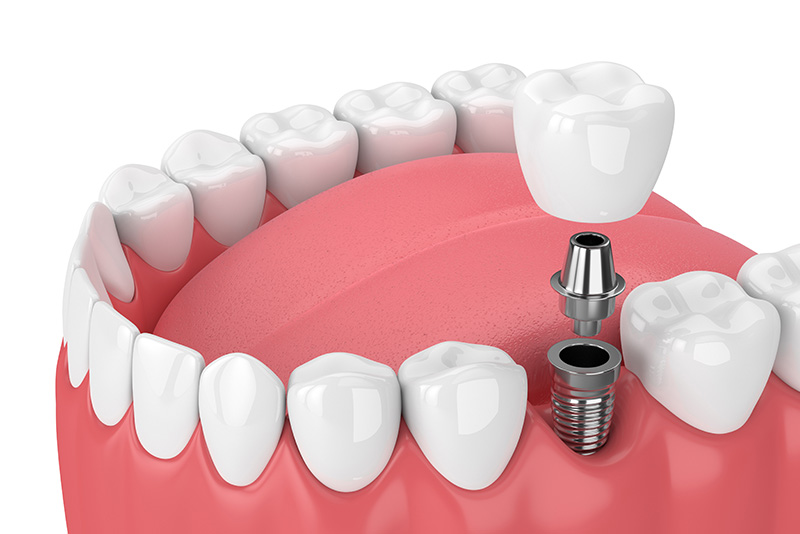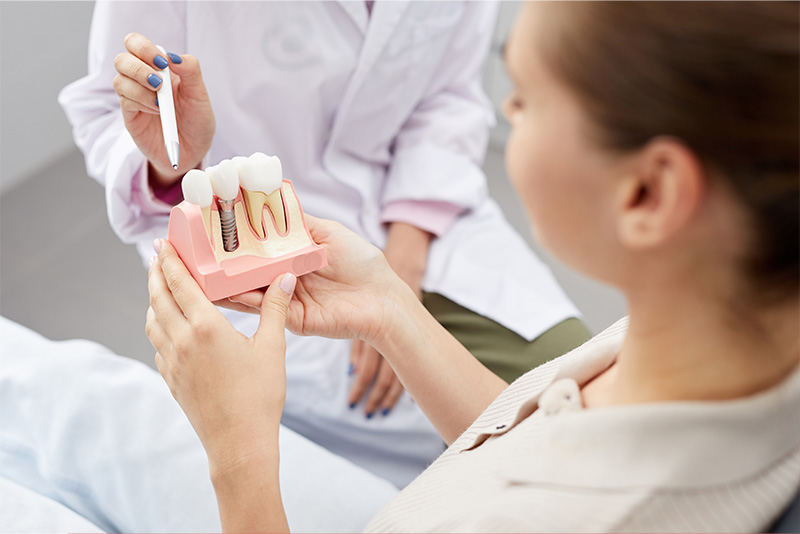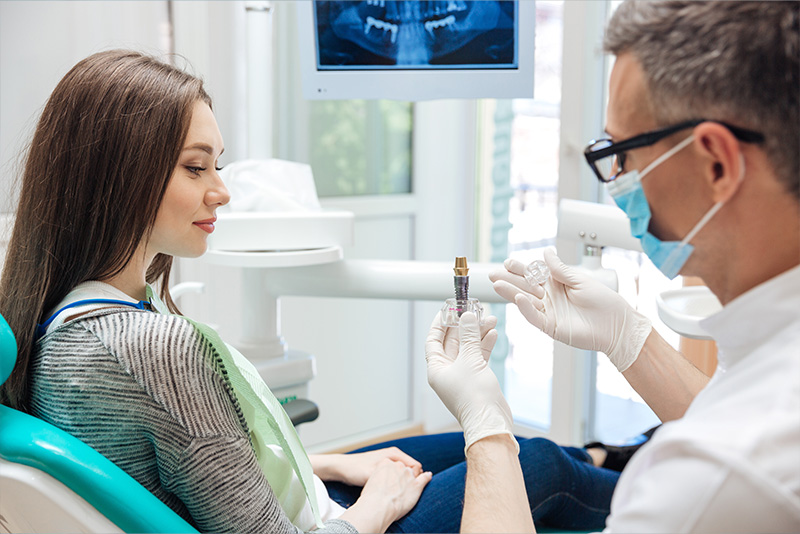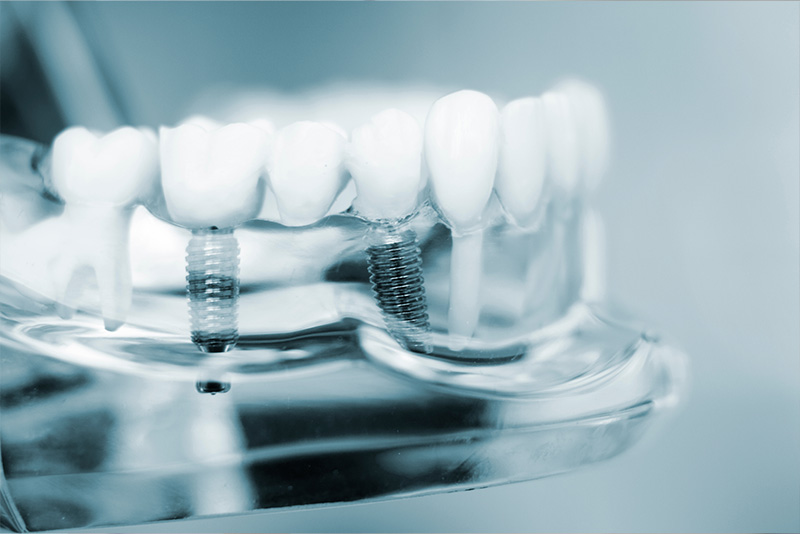Dental implants have revolutionized the way we approach tooth replacement, offering patients a long-lasting, natural-looking solution that restores both function and confidence. Unlike traditional bridges or dentures, implants are designed to integrate with the jawbone, providing unparalleled stability and durability. At Sunlight Dental Group, we are committed to delivering cutting-edge implant dentistry using the most advanced techniques and technology available.
One of the key components of our implant treatments is the use of the Hiossen EK Implant System, a state-of-the-art solution known for its superior design, enhanced stability, and long-term success. Whether you are missing a single tooth, multiple teeth, or need a full-arch restoration, dental implants can provide a permanent and aesthetically pleasing solution that feels and functions like natural teeth.


Tooth loss can have a significant impact on both oral health and quality of life. Missing teeth not only affect your ability to chew and speak properly but can also lead to bone loss, shifting of adjacent teeth, and changes in facial structure. While traditional solutions like dentures and bridges can help address some of these issues, they do not offer the same level of stability, longevity, and preservation of jawbone health that dental implants provide.
One of the main reasons dental implants are the preferred choice for tooth replacement is their ability to stimulate bone growth. When a natural tooth is lost, the jawbone in that area begins to deteriorate due to lack of stimulation. Implants act as artificial tooth roots, helping to maintain bone density and prevent further deterioration. Additionally, implants do not require alteration of adjacent healthy teeth, unlike bridges, which rely on support from neighboring teeth.
Another advantage of implants is their durability. With proper care, dental implants can last a lifetime, making them a cost-effective solution in the long run. They provide superior comfort compared to traditional dentures, eliminating issues such as slipping, discomfort, and difficulty chewing certain foods.
At Sunlight Dental Group, we use the Hiossen EK Implant System to provide our patients with the highest quality of care. This system is designed to optimize both surgical efficiency and long-term success, ensuring that patients receive the most advanced implant technology available.
The Hiossen EK Implant System features a tapered body design, which allows for excellent primary stability, making it an ideal choice for immediate placement after extraction. This means that in some cases, patients can receive their implants and temporary crowns on the same day, reducing treatment time and the number of visits required.
One of the key innovations of the EK Implant System is its surface treatment technology, which enhances osseointegration, the process by which the implant fuses with the bone. The specially treated surface promotes faster and stronger bonding between the implant and the jawbone, reducing healing time and increasing long-term success rates.
The system also includes various implant sizes and configurations to accommodate different clinical situations, ensuring that each patient receives a customized treatment plan that best suits their needs. The precision engineering of the EK Implant System enhances not only the surgical experience for the dentist but also the comfort and functionality for the patient.
The process of getting dental implants begins with a comprehensive consultation. At Sunlight Dental Group, we take the time to evaluate each patient’s oral health, medical history, and bone density to determine if they are a good candidate for implants.
During the initial consultation, we use advanced imaging technology, including CBCT scans, to create a detailed 3D model of the patient’s jawbone and surrounding structures. This allows us to precisely plan the implant placement and identify any potential challenges.
Once the treatment plan is established, the next step is the surgical placement of the implant. The procedure is performed under local anesthesia, ensuring that the patient remains comfortable throughout. The implant is carefully inserted into the jawbone, and in some cases, a temporary crown may be placed immediately.
Over the next few months, the implant undergoes osseointegration, during which it fuses with the surrounding bone. This integration process is crucial for the long-term stability of the implant. Once healing is complete, a custom-made permanent crown, bridge, or denture is attached to the implant, restoring full function and aesthetics.
At Sunlight Dental Group, we leverage the latest advancements in dental technology to ensure the highest level of precision in implant placement. Our use of CBCT imaging provides detailed 3D visuals that allow us to plan the surgery with unparalleled accuracy, reducing the risk of complications and optimizing outcomes.
In addition to CBCT technology, we utilize guided implant surgery, which involves creating a digital treatment plan and using a surgical guide to place the implants with exact precision. This technique improves the efficiency of the procedure, minimizes discomfort, and enhances healing.
The combination of advanced technology and the superior design of the Hiossen EK Implant System ensures that our patients receive the most reliable and effective implant treatments available.


Dental implants offer a level of stability, functionality, and aesthetics that far surpasses traditional tooth replacement options. Their benefits extend beyond simply filling gaps in a smile—they actively contribute to long-term oral health, overall well-being, and confidence.
One of the most significant advantages of dental implants is their ability to prevent bone loss. When a tooth is missing, the surrounding bone begins to deteriorate due to lack of stimulation. Over time, this can lead to changes in facial structure, making a person appear older. Implants mimic natural tooth roots, stimulating the jawbone and preserving its strength and density. This helps maintain a youthful facial appearance and prevents the sunken look often associated with missing teeth.
In terms of function, dental implants restore full chewing power, allowing patients to eat a varied and nutritious diet without the limitations that come with dentures or bridges. Hard-to-eat foods like apples, steak, and nuts can be enjoyed without concern. Unlike removable dentures, which can slip while speaking or eating, implants remain securely in place, eliminating discomfort and embarrassment.
Implants also promote better oral health by preventing the shifting of neighboring teeth. When a gap is left in the mouth, adjacent teeth may move out of alignment, leading to bite problems and increased risk of decay or gum disease. Implants fill the space without affecting surrounding teeth, preserving the integrity of the entire dental arch.
Another key benefit of implants is their durability. While bridges and dentures may need replacement every 5 to 10 years, dental implants are designed to last a lifetime with proper care. This makes them a cost-effective investment in long-term oral health.
From an aesthetic perspective, dental implants provide a completely natural-looking smile. The custom-made crowns are designed to match the shape, size, and color of the patient’s natural teeth, ensuring a seamless and lifelike appearance. This boost in confidence can have a profound impact on personal and professional interactions.
Overall, dental implants improve quality of life by restoring oral function, enhancing appearance, and preserving long-term health. With their numerous benefits, they are widely regarded as the gold standard in tooth replacement.
After the implant procedure, proper aftercare is essential to ensure a smooth recovery and long-term success. Most patients experience mild swelling and discomfort for a few days, which can be managed with over-the-counter pain medication and cold compresses.
It is important to follow post-surgical care instructions, including maintaining good oral hygiene and avoiding hard or sticky foods during the initial healing period. Patients should also attend follow-up visits to monitor the healing process and ensure the implant is integrating properly with the bone.
With proper care, dental implants can last a lifetime. Regular dental check-ups and professional cleanings help maintain the health of the implant and surrounding tissues. Patients should also practice good oral hygiene at home by brushing and flossing daily.
Some patients may have concerns about getting dental implants, often due to misconceptions about the procedure. One common myth is that implant surgery is extremely painful. In reality, the procedure is performed under local anesthesia, and most patients report minimal discomfort. The recovery process is generally well-tolerated, with mild soreness that subsides within a few days.
Another misconception is that implants are only for older patients. In truth, adults of all ages can benefit from dental implants as long as they have sufficient bone density and good oral health.
Some people worry about the cost of implants, but when considering their longevity and the improved quality of life they provide, they are often a more cost-effective solution compared to dentures and bridges, which may require frequent replacements.
Dental implants do more than just restore a patient’s smile; they contribute to overall health and well-being. By preventing bone loss and maintaining proper alignment of surrounding teeth, implants support long-term oral health.
They also improve dietary options, allowing patients to eat a variety of nutritious foods that may be difficult to chew with dentures. Improved digestion and better nutrition have a positive impact on overall health.
Additionally, restoring missing teeth with implants can enhance speech, self-confidence, and overall quality of life, allowing patients to smile, speak, and eat without worry.
One of the key factors in the long-term success of dental implants is the use of biocompatible materials. The Hiossen EK Implant System is made from high-quality titanium, a material known for its strength, durability, and ability to integrate with the body without causing adverse reactions. This ensures that the implant becomes a natural part of the jawbone, providing a stable foundation for the replacement tooth.
The surface of the implant is specially treated to enhance osseointegration, the process by which the bone bonds with the implant. This treatment not only accelerates healing but also improves the strength of the bond, reducing the risk of implant failure. Compared to traditional materials, these advanced titanium implants offer higher success rates and better long-term outcomes.
In addition to their structural benefits, titanium implants are resistant to corrosion and wear, ensuring that they remain strong and functional for decades. For patients concerned about metal allergies, alternative materials such as zirconia may be considered, though titanium remains the gold standard due to its proven reliability. By using the most advanced biocompatible materials, Sunlight Dental Group ensures that patients receive the safest and most effective treatment possible.
A dental implant is only as good as the restoration it supports. At Sunlight Dental Group, we take great care in designing custom restorations that blend seamlessly with a patient’s natural teeth. Whether a patient needs a single crown, a multi-unit bridge, or a full-arch restoration, we ensure that the final result is both functional and aesthetically pleasing.
Using advanced digital scanning and computer-assisted design (CAD) technology, we create restorations that perfectly match the color, shape, and size of surrounding teeth. This level of precision allows for a restoration that not only looks natural but also feels comfortable and provides optimal bite function.
For patients receiving full-mouth rehabilitation with implants, we work closely to design prosthetics that restore facial structure and provide a youthful, natural appearance. Unlike traditional dentures, which can sometimes appear bulky or artificial, implant-supported restorations are customized to enhance facial symmetry and complement a patient’s overall look.
By combining artistry with advanced technology, we ensure that each implant restoration is both beautiful and highly functional, allowing patients to smile with confidence and enjoy the benefits of a fully restored set of teeth.
These sections will integrate seamlessly into the existing page while maintaining flow and depth. Let me know if you'd like any refinements!
Most patients with missing teeth are candidates for dental implants, but an evaluation is necessary to determine suitability. Ideal candidates have good overall health, sufficient bone density, and healthy gums.
Patients with underlying conditions such as uncontrolled diabetes or severe osteoporosis may require additional considerations before proceeding with implant treatment.
In cases where bone loss has occurred, bone grafting procedures can be performed to build up the jawbone and create a stable foundation for the implant.
The cost of dental implants varies depending on factors such as the number of implants needed and any additional procedures required. While some insurance plans may cover part of the cost, implants are often considered an elective procedure.
At Sunlight Dental Group, we offer financing options to make dental implants more accessible to our patients. We believe that everyone deserves a healthy, confident smile, and we work with patients to create affordable payment plans.
Dental implants are titanium posts surgically placed into the jawbone to serve as artificial tooth roots, providing a permanent solution for missing teeth.
Dental implants integrate with your jawbone through a process called osseointegration, which provides a stable foundation for a custom crown.
Benefits include a natural appearance, improved functionality, prevention of bone loss, and long-lasting durability.
The procedure typically involves multiple steps: consultation, treatment planning, implant placement, osseointegration, abutment placement, custom crown creation, and final placement.
The entire process may take several months, depending on individual healing times and any additional procedures needed, such as bone grafting.
Candidates typically have good oral health, sufficient bone density, and no medical conditions that would hinder healing. A consultation with a dentist in Pearland can determine your eligibility.
During this visit, your dentist will assess your dental health, discuss your options, and create a personalized treatment plan.
Most patients report minimal discomfort during the procedure due to anesthesia or sedation. Pain management options are available afterward.
The healing period can vary, but osseointegration typically takes several months before the crown can be placed.
Caring for dental implants involves regular brushing, flossing, and routine dental check-ups to maintain oral hygiene.
With proper care, dental implants can last a lifetime, making them a durable option for tooth replacement.
After the procedure, it’s advisable to avoid hard foods during the initial healing phase to prevent damage to the implants.
Smoking can hinder healing and increase the risk of implant failure. It's recommended to quit or minimize smoking for the best outcomes.
If your jawbone lacks sufficient density, your dentist may recommend bone grafting to create a stable foundation for the implants.
Coverage for dental implants varies by insurance provider. It's best to check with your insurance company regarding your specific plan.
In some cases, immediate implant placement is possible, but it depends on individual circumstances and the dentist’s evaluation.
Unlike dentures, dental implants are permanent, more stable, and do not require adhesive. They also help preserve jawbone health.
During this visit, your dentist will attach the custom crown to the abutment, completing your dental implant restoration.
You can visit local attractions like Pearland Town Center, Southwyck Golf Club, Centennial Park, and the Pearland Farmers Market while you recover.
Look for qualified dental professionals in Pearland who specialize in dental implants and offer comprehensive consultations to guide you through the process.